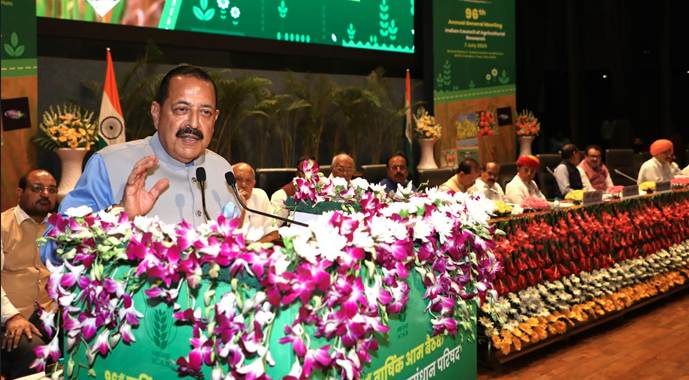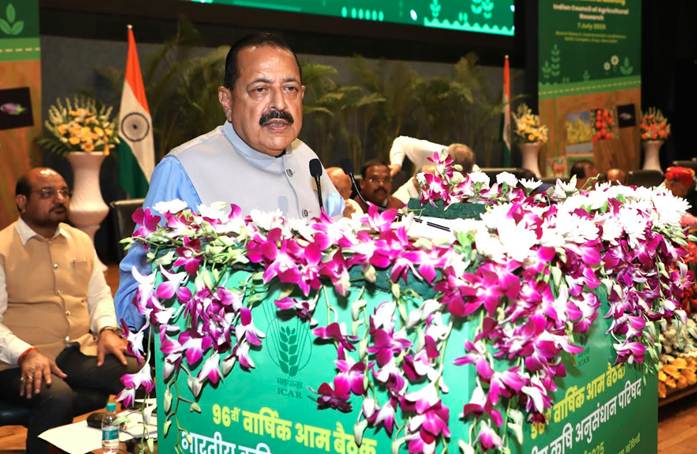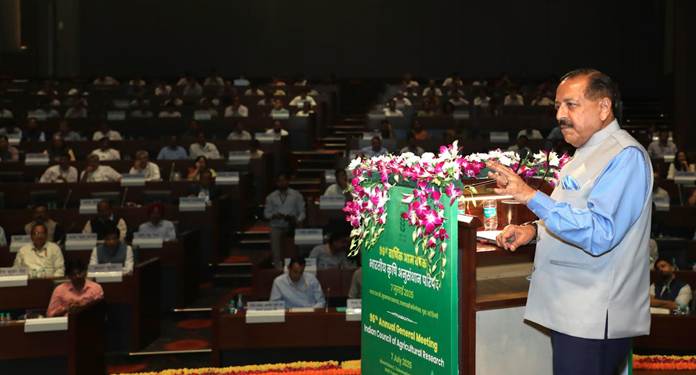Dr. Jitendra Singh Urges Rapid Adoption of Agri-Tech to Boost India’s GDP
Dr. Jitendra Singh Urges Rapid Adoption of Agri-Tech to Boost India’s GDP
Union Minister of State (Independent Charge) for Science and Technology; Earth Sciences and Minister of State for PMO, Department of Atomic Energy, Department of Space, Personnel, Public Grievances and Pensions, Dr. Jitendra Singh today called for a paradigm shift in the agriculture sector by embracing cutting-edge technology and fostering greater synergy among stakeholders, as he addressed the 96th Annual General Meeting of the ICAR Society at the NASC Complex in the capital.
Speaking at the high-profile event chaired by Union Agriculture Minister Shri Shivraj Singh Chouhan, Dr. Singh underscored that every technology available globally is now accessible within India. “It is no longer about whether technology is available—it is about how fast we adopt it and integrate it into our agricultural ecosystem to add value to our economy,” he said.

The Minister stressed the importance of breaking mental and institutional silos, noting that many in the agriculture value chain are not just unaware of new technologies, but also unaware that they are unaware. “Technology in agriculture has progressed rapidly under Prime Minister Narendra Modi’s leadership over the past 11 years. Yet, its full potential remains untapped at the ground level,” he added.
Pointing to success stories like the Lavender Revolution in Jammu and Kashmir, where over 3,500 startups have emerged around lavender cultivation, Dr. Singh emphasized how new-age farming—using satellite imaging, remote-controlled tractors, and order-based crop production—is reshaping the agricultural narrative. “From lavender in Bhaderwah to off-season tulips grown for temple offerings, we have examples where science and strategy have combined to generate both income and innovation,” he noted.

He also highlighted that biotech-driven advances, such as pest-resistant cotton developed through Department of Biotechnology initiatives and radiation-based food preservation techniques by the Department of Atomic Energy, are redefining how produce is grown, stored, and exported. “Our mangoes now fly to the U.S. thanks to these technologies. And yet, many states have not come forward to fully exploit these tools,” he observed.
In an earnest appeal to state agriculture ministers and institutional stakeholders, Dr. Singh proposed more frequent and informal cross-ministerial interactions to ensure real-time exchange of innovations. “We should not wait for annual meetings alone. Let’s create working groups and reach out when solutions can be shared, spontaneously and practically,” he urged.

Referring to the Marine Agriculture initiative in coastal states and the cultivation of mangoes in Manipur or apples in Andhra Pradesh, the Minister cited these as “non-traditional yet highly viable” ventures that show how India’s agri-map is being redrawn through science.
The meeting, attended by key Union and state ministers, scientists, and officials from ICAR and associated ministries, also saw the release of key ICAR publications and presentations on annual reports and financials.
“Our biggest challenge isn’t lack of technology. It’s the lack of connectedness between those who develop it and those who need it. That is the bridge we must now build,” he concluded.
The AGM ended with a vote of thanks and a renewed commitment to harnessing India’s scientific edge for agricultural resilience and economic growth.
****